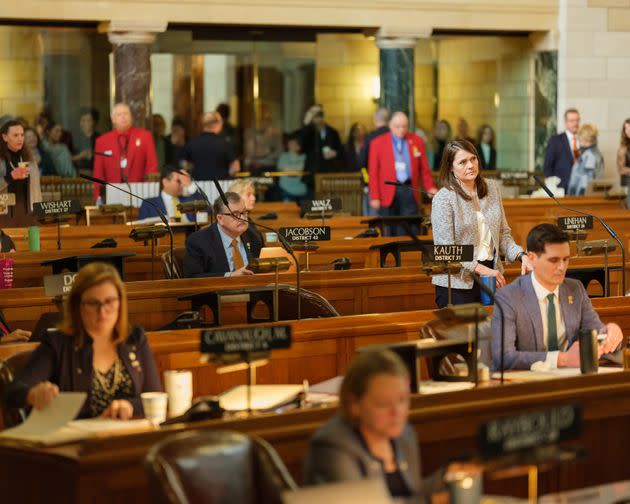A Nebraska Lawmaker Ground Legislating To A Halt To Stop An Anti-Trans Bill

Nebraska state Sen. Machaela Cavanaugh, a Democrat in a GOP-controlled chamber, was angry and sick when she decided to launch a weeks-long filibuster over legislation seeking to ban gender-affirming care. Nebraska traditionally has one of the least polarized legislatures in the nation.
Last month, when Nebraska state Sen. Machaela Cavanaugh vowed to “burn the legislative session to the ground” over a bill to ban gender therapy for transgender youth, she was sick with strep throat and couldn’t leave the capital because of an ice storm.
“I was mad. I was activated. I was too sick to give a shit,” she said.
The following day, Cavanaugh gave what would quickly become a viral speech promising to use every available tool to “inflict pain upon this body,” referring to the Nebraska Legislature. It would launch what is now a multi-week filibuster over Legislative Bill 574, a proposal to outlaw gender-affirming care, specifically surgery and hormonal therapies, for minors. The legislature’s rules have allowed Cavanaugh, a Democrat, to essentially bring its 2023 session to a standstill over her opposition to LB574, using what has become a valuable bargaining tool for members of the Democratic minority.
And in the end, it almost worked.
After pledging to remove references to cross-sex and puberty-blocking hormones, LB574’s primary sponsor, Republican Kathleen Kauth, was able to secure enough votes Thursday to end discussion on the bill and advance it to a review stage. Cavanaugh, who was optimistic earlier in the week about having reached a deal to kill LB574, seemed to suggest that her filibuster would continue since the bill was alive and progressing. Nebraska lawmakers have been unable to pass any bills so far this session, resulting in a backlog that has frustrated even members of Cavanaugh’s own party who’ve suddenly found themselves at the center of the nation’s culture wars.
“People are trying to blame me for the outcome of today,” Cavanaugh told her colleagues Thursday. “I do not have control over your fingers. I do not have control over your buttons. You vote for it or you don’t vote for it.”

“People are frustrated, but I keep saying over and over again that is my intention,” state Sen. Machaela Cavanaugh said of her filibuster.
Testimony against the bill was intensely personal. Meghan Hunt, a Democratic lawmaker who has a transgender son, vowed never to work with her colleagues again. “This bill harms me in an unforgivable way. This is a line that you don’t cross with me,” she told them. “If you cross it today, you’re staying on the other side of it because you have done irreparable harm, and you’re doing harm to the [legislative body] and to Nebraskans as well. Don’t say hi to me in the hall. Don’t ask me how my weekend was.”
At several moments, tearful lawmakers pleaded with their colleagues to reconsider their votes. “We have had people who are directly impacted by this bill — kids, parents — write us, come speak to us, share their stories. And we’re prioritizing people who this bill doesn’t affect over the people who are affected by this,” Democratic Sen. John Fredrickson said.
Cavanaugh, a nonprofit project manager and the daughter of a former congressman, told HuffPost on Monday that her goal was to create exactly the kind of charged environment the legislature has become in recent weeks. Her detractors disapprove of her tactics, which they’ve called threatening and bullying. Earlier this month, one of Cavanaugh’s Republican colleagues tried to censure her for using the term “genocide” to describe LB574, which Cavanaugh believes would increase already high rates of depression and suicide among trans youth.
“People are frustrated, but I keep saying over and over again that is my intention,” Cavanaugh, 44, said during a video call Monday, sitting in front of a blue-and-yellow abstract painting that framed her face with sweeping squiggly lines. Cavanaugh, a redhead with black-rimmed glasses, sounds like a Democrat from a GOP-controlled state who finally has some leverage. “I want you to be frustrated, I want you to be mad, I want you to be irritated. I want you to want to stop this because you want to do other things.”
Ahead of Thursday’s showdown, Cavanaugh was optimistic about her chances of keeping LB574 from advancing to a floor vote. “The fight is just starting, but it will certainly be a moment of celebration and relief, because I do feel like killing this bill is going to save lives,” she said.
But behind the scenes, Kauth had been working on an amendment to remove the reference to hormonal treatments, which had become a sticking point for several Republicans, Kauth told HuffPost.
“We had a couple of people who were kinda wobbly on that, so this solidifies that for them,” Kauth said. “It’s not everything that I wanted, but it gets us to that vote.”
Republicans needed to preserve their entire coalition in order to reach the chamber’s threshold for overcoming a filibuster. The Nebraska Legislature is uniquely quirky: The state has a single, theoretically nonpartisan chamber — the Unicameral — with 49 senators who often caucus by congressional district rather than political party. Lawmakers are only in session once a year for two to three months.
In this deeply red state, Republicans predictably outnumber Democrats, 2 to 1, in the legislature, but there are moments of cross-party creep. LB547 was able to advance only because it had the support of one Democrat in addition to all 32 Republicans.
The battle over gender-affirming surgery for minors, as well as a proposed six-week abortion ban, signal a new partisan direction for what has traditionally been the nation’s least-polarized legislative body. The Nebraska Legislature is concurrently weighing a bill from Kauth banning transgender public school students from using bathrooms and playing on sports teams that don’t correspond to the gender they were assigned at birth. Last year, the chamber took up bills on rural hospitals, township libraries and seeds.
“Until this year, we had never faced anti-gay bills, or bathroom bills, or bills banning gender-affirming care,” Hunt told The Washington Post. “The legislature had never even debated a bill about banning abortion until last year.”
Cavanaugh believes LB574’s sponsors are taking their cues from national figures whipping up a dangerous frenzy over transgender issues. Donald Trump, running again for the GOP presidential nomination, has vowed to punish doctors who provide gender therapy to minors. Florida Gov. Ron DeSantis, a possible Republican presidential candidate, has taken steps to crack down on the same treatments after signing a bill aimed at preventing transgender girls from playing on girls’ sports teams.
“I do not believe that Republicans that I serve with and Republicans in the state want to victimize trans youth. I feel that people are being pulled into this conversation, and I don’t even understand what’s driving it,” said Cavanaugh, who argues Republicans are using bad and misleading data to dispute the efficacy and safety of gender therapy.

Nebraska state Sens. Machaela Cavanaugh (seated, left) and Kathleen Kauth (standing, right) are on opposite ends of the debate over gender-affirming treatment for trans youth.
Kauth told HuffPost her goal is to prevent minors from making body-altering decisions they might regret in the future, a common justification for gender therapy bans. In general, studies have found that only 1% of people who have transitioned ultimately regret the decision. And most go on to live happier lives, according to a new study from The Washington Post.
Kauth, who runs a mediation firm outside of her work in the legislature, described one conversation with a transgender girl that confirmed for her that minors are “not capable of assessing” these types of life-altering decisions, even though they require parental consent.
“I talked to one young man who is — he presents as a girl — he and his mom came in to talk, and when I talked about the rates of desistance and the fact that this might not be what you really want long term, he said, ‘It doesn’t matter, after I get the surgeries, if I don’t like it, I’ll just go back.’ I really had to say, ‘Once you cut things off, you cannot put them back on.’ This is a 16-year-old, so for this individual, they don’t understand the intricacies of that kind of a surgery and the stuff that you’re going to have to live with for the rest of your life.”
Kauth wants parents to know they have options. “When your child is in distress, it’s a chemical reaction. You want to do anything to make them feel better,” she said. “Parents who are in that situation, they’ll do whatever they need to. And if you have a doctor saying this is the only path — well, it’s not the only path.”
Cavanaugh did not respond to a follow-up Thursday about her next steps. But if her earlier interview is any indication, Cavanaugh’s work isn’t finished. She described the filibuster as a turning point for members of the legislative minority who’ve been persistently silenced. Cavanaugh is already in her second term but has been unable to get any of her priorities relating to child welfare advanced, including free meals for students and services for incarcerated mothers.
If you give the minority nothing, then you have nothing to lose, she said.
“People think, well, ‘You’re not gonna get your stuff passed.’ I was never gonna get my stuff passed. Ever. None of them were ever going to let me pass a bill. That’s a problem of their own making. They decided they were going to take everything away so that I had no reason not to fight. And they succeeded. They did a great job of that.”

 Yahoo Movies
Yahoo Movies 